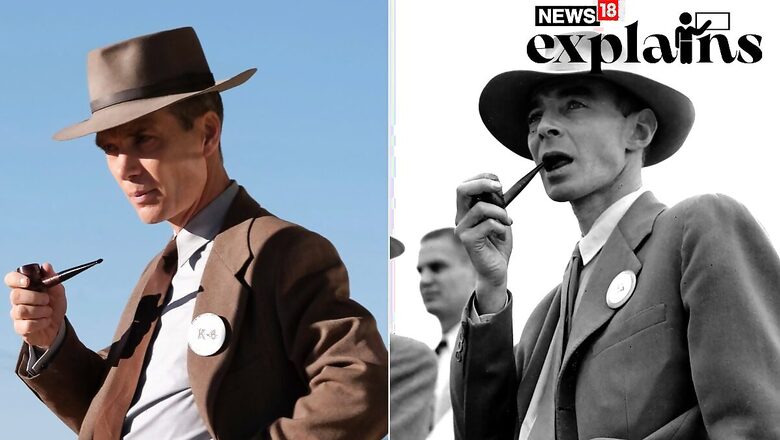
views
“Oppenheimer” is a forthcoming film directed by Christopher Nolan. It focuses on the life of J. Robert Oppenheimer, a renowned theoretical physicist known as “the father of the atomic bomb.” The movie delves into Oppenheimer’s involvement in the Manhattan Project, where he led the Los Alamos Laboratory and played a crucial role in the development of the first nuclear weapons during World War II.
What is the Movie Based On?
The narrative draws inspiration from the Pulitzer Prize-winning book “American Prometheus: The Triumph and Tragedy of J. Robert Oppenheimer” by Kai Bird and Martin J. Sherwin.
The cast includes Cillian Murphy, who takes on the role of J. Robert Oppenheimer. Murphy and Nolan have previously collaborated on several projects, including the acclaimed “The Dark Knight Trilogy,” “Inception,” and “Dunkirk.” Emily Blunt co-stars as Katherine “Kitty” Oppenheimer, J. Robert Oppenheimer’s wife, who is also a biologist and botanist with a focus on radiation effects. Florence Pugh, an Oscar nominee, portrays Jean Tatlock, a psychiatrist with whom Oppenheimer had a relationship during his time as a professor and continued to see after his marriage, as per Oscars.com.
About Oppenheimer’s ‘Triumph and Tragedy’
J. Robert Oppenheimer, born Julius Robert Oppenheimer on April 22, 1904, in New York City, was an American theoretical physicist and science administrator. He is best known for his significant contributions during the development of the atomic bomb as the director of the Los Alamos Laboratory from 1943 to 1945, also known as the ‘Manhattan Project’. Oppenheimer’s leadership and scientific expertise played a crucial role in the successful creation of the first atomic weapons, as per Britannica.
Following his work on the atomic bomb, Oppenheimer became the director of the Institute for Advanced Study in Princeton, New Jersey, serving from 1947 to 1966. However, his career took a controversial turn when he faced accusations of disloyalty and underwent a government hearing. These allegations led to the revocation of his security clearance and his removal from advisory positions within the US government’s highest ranks.
The Oppenheimer case gained widespread attention in the scientific community and beyond due to the profound political and moral questions it raised regarding the involvement of scientists in government affairs. It became a cause célèbre, prompting discussions about the responsibility and ethical implications of scientists participating in the development of destructive technologies. J. Robert Oppenheimer’s life and the events surrounding his career continue to be a subject of historical and scientific interest.
Did Oppenheimer Feel Remorse for the Atomic Attacks?
On August 6, the United States dropped an atomic bomb on Hiroshima, resulting in the destruction of 90% of the city and the death of 80,000 people. Three days later, another bomb was dropped on Nagasaki, killing 40,000 people and causing long-term effects from radiation exposure. These devastating events led many scientists involved in the Manhattan Project to question the implications of their work.
J. Robert Oppenheimer, a key figure in the project, visited President Harry S. Truman in October to discuss the need for international controls on nuclear weapons. Truman, concerned about the Soviet Union’s nuclear development, dismissed Oppenheimer’s proposal, as per a report by History.com. The scientist expressed a sense of responsibility, mentioning the blood on his hands, but Truman retorted that the burden was on him as the President. This interaction, described by author Paul Ham in Hiroshima Nagasaki: The Real Story of the Atomic Bombings and Their Aftermath, suggests that Oppenheimer was more concerned about the potential devastation of future nuclear wars rather than specifically expressing remorse for the bombings of Japan.
Following World War II, Oppenheimer worked with the U.S. Atomic Energy Commission to establish measures for controlling nuclear weapons. However, when Truman pushed for the development of a hydrogen bomb in 1949, Oppenheimer opposed it. Despite his resistance, the U.S. proceeded with the development and testing of the H-bomb in 1952. Oppenheimer’s opposition to the hydrogen bomb, coupled with allegations of Communist ties during the McCarthy era, led to his dismissal from the commission and subsequent blacklisting.
Oppenheimer’s opposition to the H-bomb played a significant role in his persecution, overshadowing the claims of Communist affiliations. The controversy surrounding him persisted until his death in 1967, with ongoing speculation about his potential involvement as a Soviet spy. Today, Oppenheimer is primarily remembered as a scientist who faced persecution for addressing the moral implications of his creation. Thankfully, since the bombings of Hiroshima and Nagasaki, no country has utilized nuclear weapons, which means we have, so far, avoided the nuclear future that Oppenheimer feared he had set in motion, the report explains.
When Did Oppenheimer Quote the Gita?
As per History.com, On July 16, 1945, a group of scientists and engineers associated with the Manhattan Project witnessed the successful detonation of the first atomic bomb at the Trinity test site in Alamogordo, New Mexico. This highly secretive project had been conducted at the Los Alamos Laboratory during World War II. Although the Allies had already declared victory in Europe by this time, they were still engaged in combat with Japan.
J. Robert Oppenheimer, a renowned physicist and the director of the Los Alamos Laboratory, observed the explosion from a distance. Oppenheimer’s recollection of that pivotal moment has become widely known.
“I remembered the line from the Hindu scripture the Bhagavad-Gita,” he said. “‘Now I am become Death, the destroyer of worlds.’ I suppose we all thought that, one way or another.”
What is the meaning of the line?
As the leader of the Los Alamos Laboratory during the Manhattan Project, J. Robert Oppenheimer is commonly referred to as the “father” of the atomic bomb. Reflecting on the first successful nuclear test, he famously remarked, “We knew the world would not be the same. A few people laughed, a few people cried, most people were silent, but it was during this period that Oppenheimer evoked his interest in Hinduism, adopting it as a philosophical framework rather than a devotional practice, as per a report in the Wired.
The Hindu scripture Bhagavad-Gita, written in Sanskrit, played a significant role in shaping Oppenheimer’s worldview. The text features a dialogue between the warrior prince Arjuna and Lord Krishna, who serves as his charioteer and represents the incarnation of Vishnu. Facing a moral dilemma on the battlefield, Arjuna seeks guidance from Krishna, who imparts wisdom on the concept of dharma, or sacred duty. Dharma is one of the four key teachings of the Bhagavad-Gita, alongside desire or lust, wealth, and the pursuit of righteousness, as per the report.
Oppenheimer was particularly struck by a verse in which Krishna reveals his universal form, appearing as a magnificent and awe-inspiring being. In July 1945, as Oppenheimer witnessed the Trinity nuclear test, he recalled the verse: “If the radiance of a thousand suns were to burst at once into the sky, that would be like the splendour of the mighty one.” Another verse that resonated with him was Krishna’s statement, often paraphrased as “Now I am become death, the destroyer of worlds.” In Hinduism, which views time non-linearly, this phrase represents the concept of world-destroying time, emphasizing the belief that everything is ultimately within the hands of the divine.
Oppenheimer’s engagement with Hindu philosophy helped him make sense of his actions and the tremendous consequences of his involvement in the atomic bomb project. While he did not fully convert to Hinduism, his exploration of its teachings offered him a framework to understand the complexities and moral implications of his role in the development of nuclear weapons, as per the report.


















Comments
0 comment